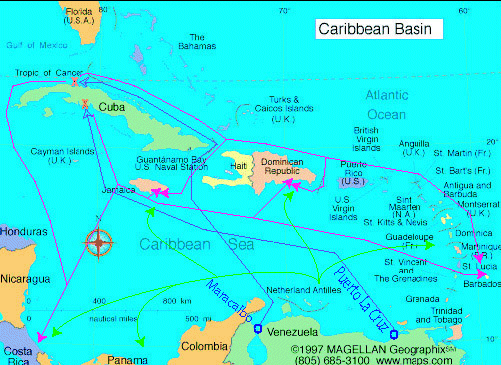Hugo Chavez: Pirate Of The Caribbean
Editorial | Investors.com
21.05.05 | Latin America: Odd, that as "popular" as Venezuelan President Hugo Chavez is said to be, he's so detested by Venezuelans that he can no longer go to baseball games without being booed by the whole stadium.
Odder still, as "appealing" as Chavez is touted around the hemisphere, every politician running for office — from Ecuador to Bolivia to Mexico — has one moment where he stresses to voters that he "won't be the next Hugo Chavez."
The contradictions mean something ominous: There's a bully stalking the hemisphere, and his shadow is lengthening. The region's weakened states have well-founded fear of being Chavez's next target. He can cut off their oil. He can crush their economies. In the past two years, he's done it on a hair trigger.
He did it to Colombia this year, shutting down border trade in a dispute over the apprehension of a terrorist. Before that, he did it to the Dominican Republic, cutting off oil in a fit of pique over an asylum case. Indirectly (at the very least), he's supporting Bolivia's coca-growing roadblockers who are trying to starve Bolivian cities into submission to their demands for investment-killing taxes. That's economic warfare.
Now he's telling Caribbean and Central American states that if they hope to buy a drop of Venezuelan oil, they'll go through Castro's Cuba. He has announced a new scheme to put Venezuela's Caribbean oil operational headquarters in Havana.
"There is no technical reason to justify an office in Havana," Venezuelan economist Gustavo Garcia told investors.

Between oil and coercion, the new headquarters is a move to isolate smaller Caribbean and Central American states into a Cuba-Venezuela axis. The map above shows the economic absurdity of moving oil operations from Venezuela's nearby Caribbean ports to Havana's port nearly 1,000 miles away. It also illustrates a new and growing sphere of influence.
Since the countries will be dependent on Venezuelan oil from Cuba's capital, don't imagine any of those countries will try to cross Fidel Castro. The countries are small and numerous, but that's why their votes are so valuable to Chavez and Castro in international bodies like the Organization of American States and United Nations. The implication for the U.S. could be very negative.
Chavez would have the world think that this is just an alternative to the Free Trade of the Americas Agreement proposed by the U.S. It's not. It's isolation from the U.S., with no gains for the region. The fact that Chavez can't persuade even one state to join his ALBA Bolivarian Alternative for the Americas "trade" pact signals Chavez's interest in using a more pointed coercion through this Havana arrangement.
Although the Venezuela-Cuba oil axis apes the idea of free trade, there's nothing economic about it. Alvaro Vargas Llosa, in his new book, "Liberty for Latin America," identifies leaders' views of such protectionist trade deals as "a military exercise," like generals dividing up territory. In these set-ups, Vargas Llosa says, "no government sees trade as a spontaneous activity by people who want to benefit themselves and each other."
Considering Chavez's actual militarization of the region, through huge arms purchases and now his talk of buying advanced Russian aircraft capable of reaching Miami, the comparison may be more than figurative.
At the very least, it's a politicization of oil sales. Venezuela gains nothing by an economic alliance with Castro. Castro gives nothing of value in return for Venezuela's 90,000 barrels of oil a day, worth $1 billion, shipped each year to Cuba. This deal signals Venezuela's growing federation with Castro's Cuba.
Right now, Cuban agents can operate freely in Venezuela. They control the security apparatus and have 30,000 "doctors" in country monitoring the barrios.
Castro does have useful purposes for Chavez. Whatever the true level of Chavez's popularity, he's a nervous leader, cocooned by security, alarmed by the unprecedented corruption around him and raving about enemy encirclement.
He's so afraid of potential rebellions that some observers believe his real game is to set up a safe place in Havana for Venezuela's biggest money centers — oil and banking. That in turn would keep cash within his access. No people-power revolution can reach this money in Havana.
So, if there's a revolt in the restive oil fields of western Venezuela or in Caracas, money will still be accessible to Chavez's political machine, far from the hands of his democratic opponents.
Venezuelan cash in Havana also props up Castro. Ironically, this oil alliance will likely serve to entrench both leaders. That in turn will free them to take up more predatory practices around the region. A long shadow of tyranny over the Americas looks to be lengthening.
send this article to a friend >>
